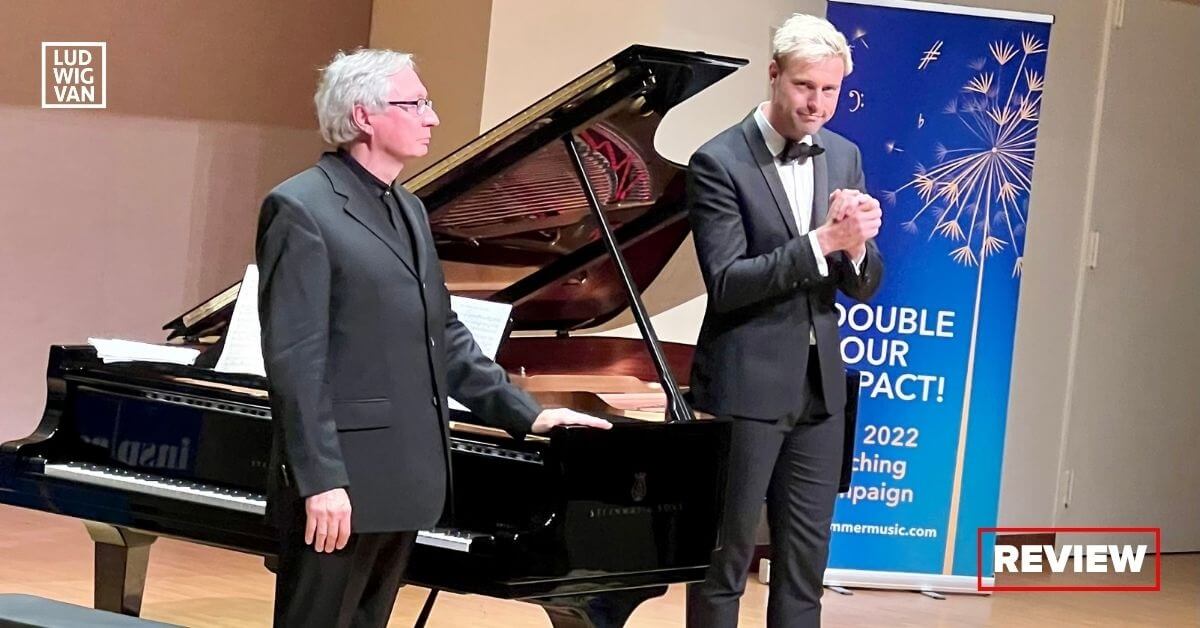
David Lang: flower, forget me (Canadian Premiere); Schubert Die schöne Müllerin. Benjamin Appl, baritone; Wolfram Rieger, piano. Walter Hall, July 11, 2022.
For Toronto art song lovers, Monday evening’s Liederabend by German baritone Benjamin Appl and pianist Wolfram Rieger will stay in the memory bank for a very long time, as an early highlight of the 2022 Toronto Summer Musical Festival.
The German-born, London-based baritone just turned 40 less than two weeks ago, still a relatively young age for a classical singer. Already he is widely regarded as one of the best recitalists in front of the public today, appearing in all the important concert halls and recital stages from Wigmore Hall to Concertgebouw to Carnegie Hall.
Originally scheduled to appear in 2020 TSMF, but twice postponed due to COVID-19, Appl’s Toronto debut last evening marked his return to Canada after a long absence. He had previously sung at the Banff Centre way back in 2012, near the very beginning of his career, in Britten’s Owen Wingrave, as well as the song cycle of Kindertotenlieder with Johannes Debus.
The audience last evening was treated to Schubert’s great song cycle Die schöne Müllerin. To our surprise, there was an addition of an opening piece, the Canadian premiere of David Lang’s flower, forget me, lower-case intended, commissioned by the Konzerthaus Dortmund, and composed specifically for Benjamin Appl.
The singer spoke to the audience about its genesis, detail notes of which by the composer can be found in the e-program. It’s a work of reflections on the impermanence of life, as represented by the dying flower, a central metaphor in a great number of Schubert songs. Schubert used the poems by Wilhelm Müller for the Müllerin cycle. Lang chose one poem not used by Schubert as the basis for flower, forget me.
As with any new work, it takes repeated hearings for a full appreciation. Hearing it for the first time, I find it tonal and generally accessible to the audience. I noticed a couple of what I feel are quirks — to my ears, the piano accompaniment as written doesn’t seem to connect all that closely with the vocal line. Also, considering that it was composed with Appl’s voice in mind, the low tessitura sits uncomfortably for the singer’s high baritone, especially in the first half. Typically, a special commission represents a close collaboration between the composer and the artist, with the goal is to show the performer at his/her best. So, what gives?
I asked Appl about this in my interview with him the day after. He explained that the low tessitura was part of the dramatic expression.
“We talked about it, and it’s something he (Lang) wanted to have it that low, to make it sound creepy and insecure, like someone who can’t really reach or sing so much but coming from speaking,” explains Appl. “The musical language is very different…it’s not really a piece of singing, but a sort of reciting and finding different colours, very different from Die schöne Müllerin.”
I hope to have the opportunity to hear it again.
Without pause, Appl and Rieger went from the misery and despair of the Lang protagonist into the happy young man in “Das Wandern.” Unlike the TSMF opening at Koerner Hall, where the audience didn’t have access to the song texts, here the translations were projected onto the wall above the stage.
For the next hour, Appl and Rieger gave a virtual masterclass on this great song cycle. Appl’s beautiful lyric baritone took the audience on an emotional journey of the young man infatuated with the miller’s daughter. He sang with wide-ranging dynamics, from gorgeous mezza voce with moments of near whisper, to incisive, hall-filling fortissimos (“Der Jäger”), always attentive to textual nuances and never abandoning the beauty of tone. In the sad songs near the end of the cycle, I had a lump in my throat.
A Liederabend is a collaboration, and Appl had the best collaborator in Wolfram Rieger, an elder statesman with impeccable credentials, one of the very best in the business. Exemplary was his total support of the singer, always in sync, never unnecessarily flashy, yet never shirking the (relatively few) moments Schubert allows the pianist to shine in this cycle. His playing was always at the service of the music, and it was awesome.
After the new piece followed by the hour-long Die schöne Müllerin, Appl still had the energy to give an encore, something one rarely encounters in recitals of complete song cycles. It was the quiet and reflective “Wanderers Nachtlied,” a fitting piece to bring the recital to an end. The knowledgeable and well-behaved audience leapt to its collective feet. My European friends often say to me rather dismissively: “Argh you North Americans, with your standing ovations….”
You know what? With Benjamin Appl and Wolfram Rieger, it was completely well deserved — Bravi tutti!
#LUDWIGVAN
Get the daily arts news straight to your inbox.



